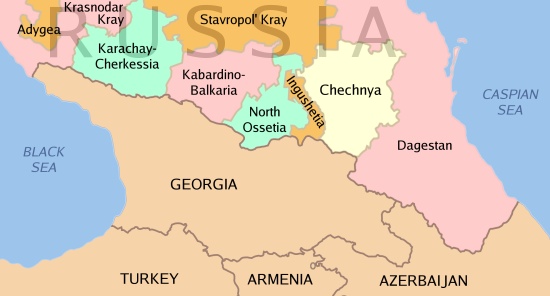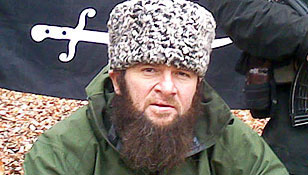 Terror returned to Moscow the morning of March 29 when a pair of female suicide bombers blew themselves up in the city’s subway system (the second busiest in the world) during the morning rush, killing 40 people and wounding 90 others. The cable news channels in the United States began coverage of the attacks soon after they occurred and almost immediately began pointing to “Chechen separatists” as the likely culprits—which would have been a fine assumption to make, say, ten years ago.
Terror returned to Moscow the morning of March 29 when a pair of female suicide bombers blew themselves up in the city’s subway system (the second busiest in the world) during the morning rush, killing 40 people and wounding 90 others. The cable news channels in the United States began coverage of the attacks soon after they occurred and almost immediately began pointing to “Chechen separatists” as the likely culprits—which would have been a fine assumption to make, say, ten years ago.
Suicide bombings have been occurring with disturbing frequency lately in Russia’s Caucasus Mountains region, but the perpetrators today are not Chechen insurgents fighting for an independent homeland, but rather a motley collection of jihadists trying to carve a fundamentalist Muslim state out of Russia’s southern flank. It was a point that at least one noted Russia analyst tried to make on CNN, though host Kyra Philips followed up by ending their segment with her rebuttal: “and then there are the Chechen separatists…” The “Chechen separatist” assumption ruled the coverage of the Moscow bombings on the U.S. networks for the rest of the day.
 To understand the situation today in Russia, it helps to take a step back. The rugged peaks and isolated valleys of the Caucasus Mountains between the Black and Caspian Seas have put the region in the path of several millennia worth of empires trying to spread from the Middle East into Eurasia, or vice-versa, a history that has instilled a fierce independence among the natives of the region, while also causing them to be (somewhat understandably) suspicious of outsiders. For Russia, the Caucasus have been a source of trouble ever since the czar first absorbed the region into the empire two centuries ago.
To understand the situation today in Russia, it helps to take a step back. The rugged peaks and isolated valleys of the Caucasus Mountains between the Black and Caspian Seas have put the region in the path of several millennia worth of empires trying to spread from the Middle East into Eurasia, or vice-versa, a history that has instilled a fierce independence among the natives of the region, while also causing them to be (somewhat understandably) suspicious of outsiders. For Russia, the Caucasus have been a source of trouble ever since the czar first absorbed the region into the empire two centuries ago.
After the fall of the Soviet Union, the desire for independence again started churning through the region. One area agitating for self-determination was the Chechen Republic on the southern fringe of the newly formed Russian Federation. At the same time, midway through his first term, Boris Yeltsin, Russia’s first president, saw his approval ratings falling. (Sidenote: actually caring about “approval ratings” was a new development for Russian/Soviet leaders.) The story goes that Yeltsin’s inner circle convinced him that a quick military victory over the restive Chechens would be just the thing to get the people to again view him as a strong leader, with the added benefit of propping up the battered image of Russia’s military in the wake of the Soviet collapse. They promised the war would last no more than six weeks. It dragged on for two bloody years and was marked by brutal fighting and horrific atrocities committed by both sides.
The war ended with Russia giving the Chechens a large degree of autonomy, and the status quo held for three years, until a series of terror bombings of apartment buildings in Russia kicked off the Second Chechen War. While the bombings were officially attributed to Chechen terrorists, conspiracy theorists say that Russia’s own security service, the FSB, were really behind the attacks—which were meant to allow Russia’s new president and former KGB agent Vladimir Putin to establish his own bona fides as a “strong leader”. A second brutal war was soon underway, though this conflict stretched beyond Chechnya’s borders. A series of high-profile terrorist attacks were committed across Russia, including: the 2002 siege at Moscow Dubrovka Theater that left more than 100 dead; the 2004 massacre of more than 300 people, many of them children, at a school in Beslan; and the twin bombings of civilian aircraft on August 24, 2004. The message from the Chechens was clear—if Russia brought war to their homeland, they would bring war to Russia.
The Chechen ranks were also boosted by an influx of international jihadists and Islamic fundamentalists whose fighting skills had been honed by years of combat on battlefields from Bosnia to Afghanistan. Their fundamentalist view of religion was at odds with the more relaxed approach the Chechens traditionally took towards Islam, an approach moderated by the role of clan and family ties in local culture and decades of Soviet secularism. The influx of jihadis was enough to prompt the head of one of Chechnya’s most powerful clans, Akhmad Kadyrov, to switch sides and pledge his allegiance to Moscow—Kadyrov thought that the fundamentalists posed a more serious threat to Chechnya than did the Russians. He became the president of the Republic of Chechnya (which remained part of Russia) and would eventually be assassinated in 2004 by fellow Chechens who didn’t appreciate his change of heart. His son, Ramzan, took over as president and Moscow was eager to strike a deal, giving him a free hand in running Chechnya if he could bring the territory under control.
In response, Ramzan launched his own brutal war in Chechnya. Any separatists who didn’t join the Kadyrov government were likely to find themselves kidnapped by Kadyrov’s private militia (the “Kadyrovtsy”) and tortured, shot, or otherwise “disappeared.” Kadyrov’s political opponents—Chechen Islamists, reporters, human rights activists, and anyone else who ran afoul of Kadyrov the Younger—were likely to meet the same fate. (For an example of just how brutally Russian security forces have acted in the region, when Dzhanet Abdurakhmanova, one of the two Moscow subway bombers, married a known Islamic militant a few years ago, her family disowned her out of fear of retribution. According to the Associated Press, “they knew they could face torture from Russian security forces or even death for associating with the militants…”) By 2009, the violence in Chechnya had dropped to “acceptable” levels, but the insurgency didn’t disappear, it merely spread to Chechnya’s neighbors: Ingushetia, Dagestan, and North Ossetia.
The top insurgent is now Doku Umarov, a man who talks not about liberating Chechnya, but instead of creating a perfect Islamic state across the region, and who has crowned himself “the Emir of the North Caucasus Caliphate.” Suicide bombings are common in the region with police and security forces the usual targets, though last June terrorists were nearly successful in assassinating the president of Ingushetia via truck bomb.
 Fifteen years after Boris Yeltsin first sent in troops, things are arguably worse in the region now than ever before. It seemed for a while that Russia’s current president, Dmitry Medvedev, might finally understand that the Caucasus region won’t be pacified through brutal security tactics alone. Medvedev talked about the need for economic development and jobs in this grindingly poor corner of Russia, as well as the need to replace corrupt and incompetent local officials, who are more of a hindrance than a help to the local population. But the Moscow bombings of March 29 have once again returned the dialogue to “tough-guy” politics. Prime Minister Vladimir Putin immediately promised to “drag [the terrorists] out of the sewer,” which seems to promise yet another series of heavy-handed security operations in the Caucasus region. Whether this old tactic will have any more success than it has in the past is yet to be seen.
Fifteen years after Boris Yeltsin first sent in troops, things are arguably worse in the region now than ever before. It seemed for a while that Russia’s current president, Dmitry Medvedev, might finally understand that the Caucasus region won’t be pacified through brutal security tactics alone. Medvedev talked about the need for economic development and jobs in this grindingly poor corner of Russia, as well as the need to replace corrupt and incompetent local officials, who are more of a hindrance than a help to the local population. But the Moscow bombings of March 29 have once again returned the dialogue to “tough-guy” politics. Prime Minister Vladimir Putin immediately promised to “drag [the terrorists] out of the sewer,” which seems to promise yet another series of heavy-handed security operations in the Caucasus region. Whether this old tactic will have any more success than it has in the past is yet to be seen.
A version of this article was published simultaneously at our partner site, The Mantle.
Ed Hancox works in nonprofit development. He holds a M.A. degree in International Affairs from The New School where he worked as a research associate on a project examining Russia’s transition from Communism.